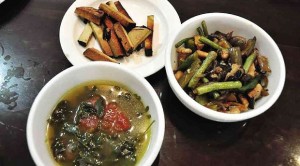How a plant-based diet can reduce hypertension and prevent stroke

MEATLESS BUT MORE NUTRITIOUS Malunggay soup (with tomatoes, onions, organic vegan bouillon cubes and Himalayan salt), string beans (with shiitake mushrooms, okra, eggplant, Braggs tomato sauce) and oil-less fried, non-GMO soy wheat stick (with seaweeds). Safe proteins were found to be from plants. INQUIRER FILE PHOTO by Tessa Salazar
What do five of the 10 leading causes of illness and death in the Philippines have in common? Coronary heart disease, cancer, stroke, diabetes and atherosclerosis are all associated with our diets.
In particular, stroke, a disease of the vascular system, has strong links to what we eat.
Experts say that nutrients found in plants are associated with a lower risk of cognitive decline in old age, and that food sourced from plants is one of our best natural allies to help prevent stroke.
Scientist T. Colin Campbell, PhD, coauthor of “The China Study,” cited a publication from the well-known Framingham Study which had researchers concluding that for every three additional servings of fruits and vegetables a day, the risk of stroke could be reduced by 22 percent. This was published in the Journal of the American Medical Association (Jama) titled “Protective effect of fruits and vegetables on development of stroke in men” by Gilman M.W., Cupples L.A., Gagnon D., et al.
“Three servings of fruits and vegetables is less than you might think. The following examples count as one serving in this study: 1/2 cup peaches, 1/4 cup tomato sauce, 1/2 cup broccoli, or one potato,” said Campbell, who is a vegan, when he was interviewed by Inquirer Science and Health a few years ago.
Campbell said: “Half a cup is not much. In fact, the men in this study who consumed the most fruits and vegetables consumed as many as 19 servings a day. If every three servings lower the risk by 22 percent, the benefits can add up fast (risk reduction approaches but cannot exceed 100 percent).”
Campbell noted that this study provides evidence that the health of the arteries and vessels that transport blood to and from your brain is dependent on how well you eat. By extension, it is logical to assume that eating fruits and vegetables will protect against dementia caused by poor vascular health.
Effective vs hypertension
Vegetarian diets also reduce the risk of hypertension, according to new research published recently in the Jama Internal Medicine by physicians committee president Neal Barnard, MD, and researcher Yoko Yokoyama, PhD, MPH. The meta-analysis compared blood pressure from more than 21,000 people around the world and found study participants who followed a vegetarian diet had a systolic blood pressure about 7 mm Hg lower and diastolic blood pressure 5 mm Hg lower than study participants who consumed an omnivorous diet. The study was also published in the health website Fit Fathers.
“Instead of readjusting the definition for hypertension, as was done in the recent guideline revision, let’s write prescriptions for plant-based foods,” Barnard said. “Compared to antihypertensive drugs, a diet change brings only desirable ‘side effects,’ including healthy weight loss and improved cholesterol, along with the lower blood pressure.”
The Jama meta-analysis report also pointed out that:
Obesity, sodium and alcohol consumption increase blood pressure and risk for hypertension.
Potassium intake and physical activity correlate directly with lower blood pressure.
Unsaturated fat, protein, magnesium and dietary fiber may reduce risk for hypertension.
Hypertensive study participants who combine antihypertensive medications with a plant-based diet lower blood pressure by an average of 5/2 mm Hg in just six weeks.
A 2013 study from the American Journal of Medicine (T. Akbaraly, S. Sabia, G. Hagger-Johnson, et al.) indicated that eating more meat, dairy and other unhealthful foods could worsen the effects of aging.
After an average 16-year followup, people who consumed a “Western-type” diet, which consists of high intakes of red and processed meats, whole dairy products, and fried foods, were more likely to die prematurely and to suffer from various chronic diseases including heart disease, stroke, cancer and mental health disorders, compared with people who avoided such dietary patterns.
For alternative, nonanimal-based food sources, readers can look for vegetarian cookbooks or visit websites such as www.happycow.net.
